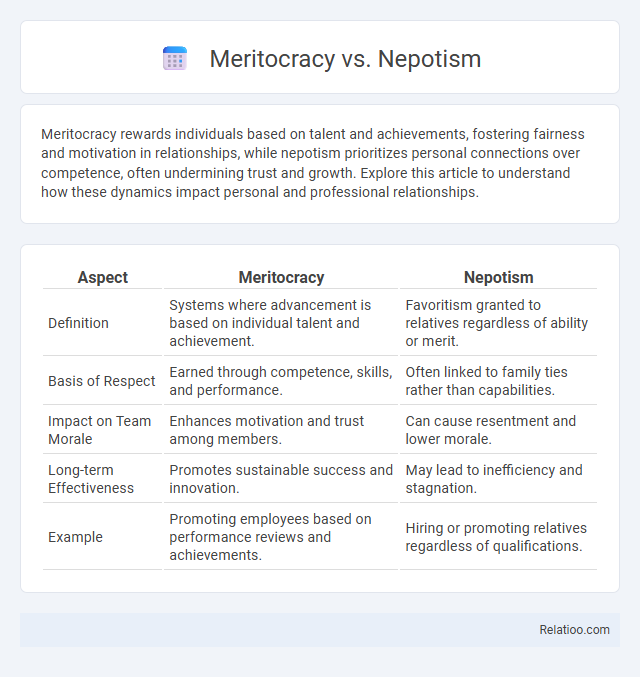Meritocracy rewards individuals based on talent and achievements, fostering fairness and motivation in relationships, while nepotism prioritizes personal connections over competence, often undermining trust and growth. Explore this article to understand how these dynamics impact personal and professional relationships.
Table of Comparison
| Aspect | Meritocracy | Nepotism |
|---|---|---|
| Definition | Systems where advancement is based on individual talent and achievement. | Favoritism granted to relatives regardless of ability or merit. |
| Basis of Respect | Earned through competence, skills, and performance. | Often linked to family ties rather than capabilities. |
| Impact on Team Morale | Enhances motivation and trust among members. | Can cause resentment and lower morale. |
| Long-term Effectiveness | Promotes sustainable success and innovation. | May lead to inefficiency and stagnation. |
| Example | Promoting employees based on performance reviews and achievements. | Hiring or promoting relatives regardless of qualifications. |
Introduction to Meritocracy and Nepotism
Meritocracy emphasizes rewarding individuals based on their skills, achievements, and qualifications, fostering efficiency and innovation in organizations and societies. Nepotism, in contrast, involves favoritism toward family members or close associates, often undermining fairness and merit-based opportunities. Understanding these concepts highlights the critical tension between equal opportunity and biased advantage in resource distribution and leadership selection.
Historical Origins of Meritocracy
Meritocracy, rooted in the philosophy of Confucian China and later formalized during the Enlightenment, emphasizes advancement based on individual talent and effort rather than birthright. Unlike nepotism, which prioritizes family connections regardless of ability, meritocracy seeks to create a fair system where Your skills and achievements dictate social mobility. This historical framework aims to reduce favoritism and promote fairness by rewarding competence and hard work over inherited privilege.
The Roots and Rise of Nepotism
Nepotism traces its roots to ancient social structures where family ties dictated power and resources, often overshadowing meritocratic principles. The rise of nepotism can be linked to its ability to consolidate wealth and influence within families or close-knit groups, undermining fairness and equal opportunity in professional and political arenas. Understanding these dynamics helps you recognize and challenge systems that prioritize personal connections over your skills and achievements.
Key Differences Between Meritocracy and Nepotism
Meritocracy rewards individuals based on their talents, skills, and achievements, ensuring opportunities are earned through performance and competence. Nepotism prioritizes personal relationships and family ties, often disregarding qualifications, which can undermine productivity and morale. Your success thrives in a meritocratic system where fairness drives advancement rather than favoritism or bias.
Advantages of a Meritocratic System
Meritocratic systems prioritize skills, talents, and achievements, ensuring the most qualified individuals secure opportunities, which enhances overall productivity and innovation. Your performance and capabilities directly influence your success, promoting motivation and a culture of continuous improvement. Unlike nepotism, meritocracy reduces favoritism and bias, fostering fairness and trust in organizational and societal structures.
The Consequences of Nepotism in Society
Nepotism undermines meritocracy by enabling unqualified individuals to secure positions based on personal connections rather than skill or talent, leading to decreased organizational efficiency and innovation. Your community suffers when nepotism erodes trust in institutions, fostering resentment and reducing social mobility for those without influential networks. This systemic unfairness hinders equitable opportunities, perpetuating socioeconomic inequalities and limiting overall societal progress.
Real-World Examples: Meritocracy in Action
Meritocracy is exemplified by countries like Singapore, where government positions are awarded based on performance and educational achievements, fostering efficient public services. In contrast, nepotism remains prevalent in numerous sectors worldwide, such as family-run businesses in Italy, where hiring favors relatives regardless of qualifications, often hindering innovation. Fairness, exemplified by organizations like Salesforce implementing transparent recruitment and promotion policies, ensures equal opportunities and merit-based recognition across diverse workforces.
Nepotism Across Industries: Case Studies
Nepotism, prevalent in industries such as entertainment, politics, and corporate sectors, often undermines meritocracy by favoring family connections over qualifications, as seen in Bollywood's frequent casting of star kids and political dynasties worldwide. Case studies reveal how nepotism leads to reduced innovation and employee morale, with companies experiencing decreased productivity due to unqualified individuals in leadership roles. Contrastingly, industries prioritizing fairness and merit-based advancement report higher performance, employee satisfaction, and sustainable growth.
Impacts on Organizational Performance and Innovation
Meritocracy drives organizational performance and innovation by rewarding skills, talent, and results, fostering a competitive and motivated workforce that continuously improves. Nepotism undermines organizational effectiveness by prioritizing relationships over competence, leading to reduced morale, lower productivity, and stifled creativity due to a lack of diverse perspectives. Fairness in organizational practices ensures equitable opportunities, enhancing employee engagement and trust, which correlates with higher innovation and sustained business success.
Balancing Merit and Connections: Moving Forward
Balancing merit and connections requires implementing transparent evaluation systems that prioritize objective performance metrics alongside acknowledging valuable networking and relationships. Your organization can foster a culture where talent develops through fair opportunities while recognizing the influence of social capital without compromising integrity. Strategic policies that combine meritocracy with equitable access help create sustainable success and trust within professional environments.

Infographic: Meritocracy vs Nepotism
 relatioo.com
relatioo.com